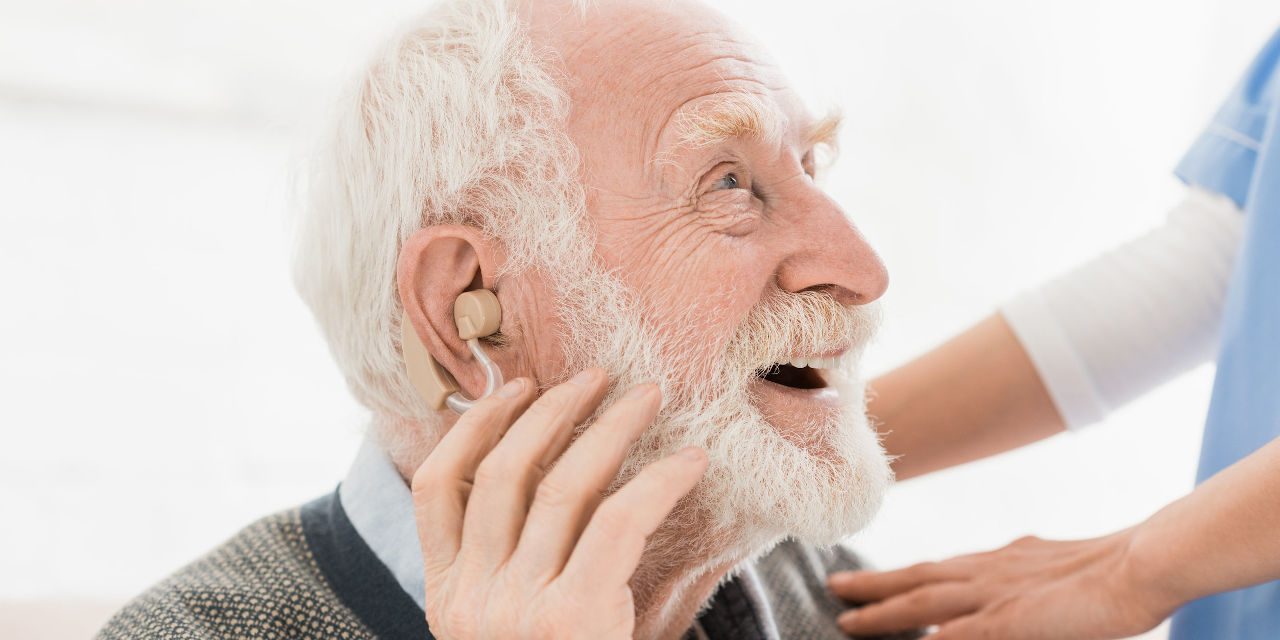By Jack Cumming
Hearing loss is common in aging, and it’s an aspect of aging that is frequently overlooked by senior living operators. Many senior facilities have a favored audiologist in private practice who visits regularly to clean hearing aids and otherwise to meet with residents about hearing challenges. While that’s positive as far as it goes, there are a number of innovations that senior living providers can implement if the welfare of their residents is paramount.
Although we recently published an article titled “Residents Want To Be Heard,” this is not a play on this theme. Yes, residents want to be heard, but they also like to hear… now that is kind of funny. This is the first part in a three-part series on how senior living operators can support hearing challenges among residents. This first part describes the opportunity. Part Two will describe the pros and cons of the low-cost provider. Part Three will deal with practical things that senior living operators can do to support hearing-impaired residents, whose numbers are considerable.
Helping With Hearing Aids
Few providers regularly advise residents on hearing issues since they generally consider that outside the scope of senior living. Still, there are simple no-liability self-tests that operators can make available to help residents know if a hearing aid could help. Better hearing can improve lives and reduce the propensity toward isolation, dementia, and even paranoia, as some who don’t hear well imagine others are speaking ill of them. The test most often mentioned is from Mimi Health, though there are others.
Once a resident decides to pursue hearing improvement, CostCo is generally considered the low-cost provider of medically approved hearing aids. Though Apple’s non-medical AirPod Pro earphones, at a much lower price point, can allow people to experience how a device can potentially improve hearing. Also, the FDA is soon to open hearing aids for sale directly to consumers without the intervention of a licensed dispenser.
Although most hearing aids are sold by audiologists who are Doctors of Audiology, licensed hearing aid dispensers can also sell hearing aids. Non-doctor-credentialed dispensers are required to pass a knowledge exam. Here is a sample question from that exam, “What test would best predict the signal-to-noise ratio necessary for a hearing-impaired person to understand speech normally in noise?” A high school diploma, a security check, and an apprenticeship are also required in California, for instance.
The Costco Effect
The most recent data suggest that CostCo has about an 11% share of the hearing aid market. Costco’s is best known as a membership model, low-cost vendor for certain categories of bulk household items. It also has a healthcare outreach including a pharmacy that provides vaccinations, an eyeglass optical dispensing unit, and a hearing aid dispensary.
Many audiologists, perhaps most audiologists, make their money on the huge markup that the hearing aid manufacturers provide. Audiologists are trained as hearing professionals, though they are compensated by that markup for selling hearing aids.
Using its mass-market impact, Costco is able to sell quality hearing aids at a sharply discounted price. Costco employs licensed “hearing aid dispensers” to program and fit the hearing aids. Because of its low cost, Costco is often the preferred hearing aid provider even though its service does not match that of most audiologists.
The Opportunity
While most very old senior living residents benefit from the care services that most providers emphasize, younger residents may have a different experience. Their focus is more on wellness services including such things as systematic tracking of physical fitness, weight loss support programs, and potentially hearing self-test opportunities.
Hearing self-testing can allow residents to know whether better hearing could improve their lives. Self-testing can allow them to explore hearing options without the pressure of an audiology visit. Self-testing and hearing improvement can also help younger residents to continue feeling young and connected.
Hearing support is one of those simple programs that can be part of an expanded “life enrichment” package designed to support sales and marketing. The image now of senior living among prospective residents is often that of cute residents doing arts and crafts and other activities considered suitable for old people. No one wants to be old, so the prospect of what life is behind the monastic walls appeals principally to a limited group of “retirees.”
Together with vision challenges, though, hearing loss is one of those conditions that make people aware of the realities of advancing age. Demonstrating a proactive approach to hearing, to enable residents to live fuller, purposeful, lives with connection and meaning, generates a much more positive image of what senior living can be.
Moreover, it bridges the growing interest among residents in technology. Residents want to be part of the solution, not just part of a problem that the industry seeks to solve. A robust self-testing hearing initiative can be part of more vibrant senior living.







